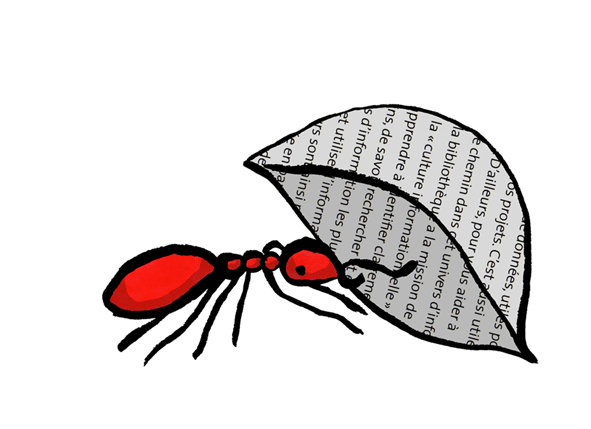|
|
|
FAQ : Frequently Asked Questions
 |
Practical questions about the move to the new library
|
Q : What will happen to the various libraries around campus?
10 libraries are merging, with their staff and collections coming together under the umbrella of the new library in the Rolex Learning Center. The libraries include: the BMA – Mathematics Library, BISCom – Chemistry and Criminal Sciences Library, BAR – Architecture Library, PM – Physics Library, Cubotron – Physics Library, IC – Information and Communication Technology Library, BiMX – Materials Library, CDM – Management School Library, CRAFT Library And The BC - Main library.
Q : Will we have access to the books during the move? Can we borrow them? Return them ?
Throughout the move, from January to February 2010, all documents may be loaned. A delay in delivering them will be necessary, though, due to the collections being moved from their current libraries to the RLC. The Main Library (BC) front desk will be open throughout the moving period to provide continual service. Books should be returned to the library to which they belong, as long as it is open. Once it closes, books should be returned to the Main Library.
Q : If the libraries are closed and the RLC is not yet open, how will we be able to borrow books?
Book loans will continue throughout the move – it is just the delivery time that will be a bit longer. The teams are prepared to ensure that a book ordered by 16:00 will be delivered by 10:00 the following day. (for details)
Q : Where will we find work stations?
The libraries will remain open until the end of the exams period in January 2010.
 |
Practical questions about the EPFL Library at the Rolex Learning Center
|
Q : What are the opening hours for the public?
The EPFL Library will be open from 07:30-24:00, 7 days a week.
The library will provide services to the professional public from 08:00-20:00, Monday to Friday.
Q : Can anyone consult books at the library, or is a student card or EPFL card necessary?
This is a public library, in other words open to everyone, including all members of the public. During opening hours anyone may consult documents. Advance registration is necessary, however, in order to borrow documents, but it is free and open to anyone resident in Switzerland.
Q : Will the EPFL Library also be open to students at UNIL or other Swiss or foreign universities?
As a public library, the EPFL Library is open to all and entry is free for everyone. Anyone who lives in Switzerland can register for free. Foreign exchange students who are here for only a short time may also register, but with some restrictions.
Q : What new features will the Rolex Learning Center offer?
First of all, opening hours and service times will be extended, but there will also be more work stations, for individuals and groups. Automatic loans will give library users easier access, shops open to the public, digital scanners and copying machines. Cultural and scientific events and activities, exhibits will grow in number and importance. And the comfort provided by the building, and the services that are part of it (student life, bookshop, cafeteria, careers center and more) will make every visit to the RLC pleasant and productive!
Q : How will you manage the noise of the different spaces that are part of the Library at the Rolex Learning Center ?
The Rolex Learning Center’s very special spatial configuration, with valleys and hills and waves, creates a unique landscape that includes several natural spaces which define calm areas and interaction ones. In the Library we believe that these zones with varying sound levels will make it possible for each person to find his or her own space. Appropriate signage, discreet, will encourage and guide people towards silent or calm areas. We have been experimenting with this gradual regulation approach to noise, for some years, in the Main Library, before trying it in the RLC. Our library users know and seem to appreciate the principle.
Q : What are RFID chips and what significance do they have for Library users? How exactly do they work?
RFID (Radio Frequency Identification) makes it possible to identify objects using radio frequency. The chips are widely used and are found on many everyday objects. In libraries these chips are integrated into the books’ adhesive strips. They deter theft and also make automatic loans possible, with library users checking out their own books. They will eventually help us manage inventory and correctly shelve documents.
For readers, the main advantage is the automatic loan system that makes it possible to check out several documents at the same time. This functionality cuts the time spent at the check-out desk during busy periods.
Q : Will there be a multimedia – including film – area?
Audiovisual and multimedia are growing in importance for research and scientific production. Wifi and cable access to the Internet will enable everyone to view online videos on his or her computer at the RLC. And the public will be able to borrow DVDs. The library will offer computers with DVD readers and earphones. The Rolex forum will show films and multimedia presentations.
 |
Some key figures on the EPFL Library
|
- 10,000 Library users, already registered
- 500,000 visits a year expected
- 60,000 documents expected to be loaned each year
- 2,000,000 million consultations of the web site http://library.epfl.ch/ in 2008
- 860 work stations
- 6,022 hours of open time a year (07:30-24:00, 7 days a week)
- 3,120 hours of service a year, to the public (08:30-20:00, Monday to Friday)
- 500,000 paper documents
- 11,000 electronic journal titles
- 15,000 electonics books
- 42 staff members, professional librarians and documentalists (equal to 30 fulltime posts)
 |
Some philosopical questions related to the EPFL Library at the RLC
|
Q : What is the rationale behind bringing together most of the libraries in one place?
Merging the libraries allows us to streamline, thereby giving us the option to offer more services and a stronger library system. In practice it means that library users can arrive at 07:30 in the morning and continue working until midnight if they wish. They will have access, free of charge, to documents that can be consulted or taken out on loan, and they will find all the tools they need to make copies, print, make digital copies. The Library will offer Internet access and electronic document resources will be available. Professional help will be available from 008:00-20:00. The professional staff is there not only to guide library users in order to help them find what they are looking for, but to train people how best to search for information related to their work and how to find virtually any document published anywhere in the world.
Some of our libraries have until now been limited in their ability to offer services on a continual basis, due to a shortage of staff and funding. By creating a single team of professionals we are able to provide a higher level of service, for longer hours.
Q : But isn’t there a risk that by adding distance, you will lose some of the library’s customers?
The service offered is better and the Library is geographically close to all the offices and laboratories at EPFL. The RLC makes up for this relatively greater distance, however, by offering more services in the same area, pulling in more visitors and users. The bookstore, cafeteria, restaurant, work rooms for groups and the Rolex forum are just some of the attractions that will pull people into the RLC, in addition to the Library, of course!
Q: Does a library with paper books still make sense in this digital age?
Yes, because people still like paper, but also because many documents do not yet exist in digital form. We are obliged to offer our users a hybrid solution that mixes electronic and physical documents.
Q : Will the proportion of students who use real libraries grow?
Our students are using our libraries more and more frequently, but less for the purpose of borrowing books and more to work, either individually or in groups. The Bologna reform and a general trend in education towards learning through projects and group work are having an impact and students today. They are looking for a mix: a place where they can either sit for several hours and work, or where they can find information on paper and electronically, and where they can choose to work in silence or interact with their fellow students.
Q : What can you provide that Google and Wikipedia don’t offer?
Google and Wikipedia are indispensable tools today, used by more than 80% of universities, some studies show. They are not enough to meet the information needs of our students and researchers, however. The Library offers its users a far larger selection of more precise, perfected research tools, but perhaps even more importantly, it helps train students to use them effectively. Once they’ve been helped by the Library, visitors are more autonomous and more efficient in their Internet research, and even in using Google. They are even better at presenting their own work and citing their sources.
To put it another way, Google and Wikipedia can be seen as hammers and nails, the tools that carpenters know best. The Library adds drills and electric saws, with instructions and training courses.
In the end, everyone benefits, by being able to work better.
Q : What are today’s Library users reading, in the way of books, magazines and e-documents, for example?
All of the above! From specialized journals to wikis, blogs, e-books, science fiction novels, videos, images, audio – you name it, but the computer screen or the e-reader for e-books are just the first step towards reading. The thing that really characterizes our scientific and cultural universe in the 21st century is the variety of medias and the systems they use today. Our Library is designed to meet the broadest possible range of needs and to gives people access to all existing channels of information.
Q: Do students work better in a library than at home?
We all have our preferences and our habits. But it’s well known that the atmosphere of a library is stimulating, that you feel less isolated than you do at home, something which is important during stressful periods and exam times. Seeing other people work motivates us. The Library is a place where we can exchange and share things with others. The comfort level today is much greater than in the past, thanks to pleasant surroundings and services like restaurants, shops, events and activities.
Q : What will the role and the job of a librarian be 10 years from now?
In 10 years technology will have moved on. The volume of information will be even larger than it is today – and that’s without even taking into consideration storage problems and the use of both analogue and digital devices for reading content. Our role will be the same as today: to help users to find information they need for their research and to carry out their projects. Our responsibility is therefore to continually develop in parallel with teaching and technological developments in order to help our Library users be independent and efficient while they are seeking information.

|
|
|

